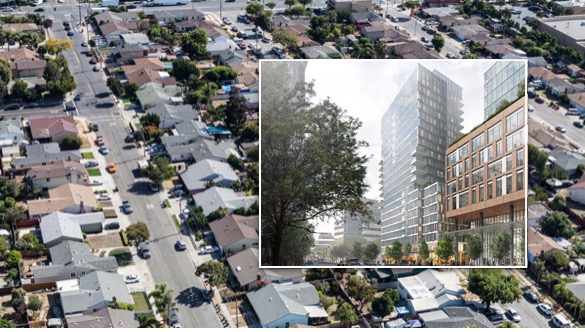Comments
PLANNING WATCH - It is not hard to identify public policies that reduce economic inequality. For example, the public sector, including cities like Los Angeles, can:
- Increase wages.
- Levy higher taxes on the wealthy.
- Repeal the Trump tax cuts.
- Eliminate tax loopholes that benefit the rich.
- Grant unions and union organizers more authority.
- Stop charging tuition at public colleges and universities.
- Extend Medicare and MediCal to the entire population.
- Expand the social wage, such as improved public parks and libraries.
- Reduce the retirement age and increase Social Security and pension payments.
But forget about these traditional policies to reduce inequality because the City of LA is thinking out of the box. Instead of conventional programs to reduce economic inequality, the City intends to increase equity (i.e., economic equality) through up-zoning. Once adopted, zoning deregulation would allow private real estate developers to build new housing in well-off, high resource neighborhoods, which City Hall calls “Racially Concentrated Areas of Affluence.”
My take on this program of zoning deregulation to promote equity is no surprise. It is cut from the same cloth as WIMBY-YIMBY claims that the deregulation of zoning laws reduces homelessness. In response to these giveaways, they believe developers will build new housing. Over time, the cost of this housing falls, and the new units will become affordable through filtering. Alternatively, deregulation produces a glut of new, expensive apartments whose prices fall through the “law” of supply and demand.

No evidence is ever presented for these imagined miracles of assisting the poor by helping rich developers become even richer. Through this column I have repeatedly asked where these miracles are taking place in LA. So far no one has shared their locations. If they exist, surely some reader will let CityWatchLA know where business-friendly up-zoning lifted low-income tenants and homeless people out of poverty.
Meanwhile, despite the lack of any City Hall monitoring to verify these YIMBY/WIMBY predictions, our eyes tell us that the opposite is happening. Where zoning deregulation has allowed new, expensive apartments to sprout, such as Hollywood, Koreatown, and DTLA, homelessness is increasing, vacant apartments are hard to fill, and poor tenants are displaced and often leave Los Angeles. For that matter, another imagined benefit of new, dense apartments has also failed to appear: increased transit ridership.
My conclusion is that the equity argument is another pretext for up-zoning affluent neighborhoods so developers can maximize profits by building, selling, and renting new high-priced in-fill housing.
What about City Hall’s argument that if new housing in ritzy neighborhoods like Hancock Park, Westwood, Holmby Hills, Brentwood, Pacific Palisades, and the Hollywood Hills, is rented to low-income families, mostly from minority communities, the new residents will experience upward mobility. For this to happen, though, two other things must also take place.
First, since low-income people, regardless of their race or ethnicity, cannot afford to buy or rent expensive new houses and apartments, they will need substantial grants or public housing vouchers. Since secure funding is not part of the City’s proposals, this miracle also contains a mystery.
Second, once the grants or vouchers inexplicably appear and are distributed, low-income people could move into these affluent areas. At this point, the secret formulas for their new neighbors’ affluence, such as inherited wealth, insider stock tips, private tutors, and family and college connections, will miraculously and mysteriously leap from the old guard to the newcomers.
For this to happen, an essential outcome of up-zoning must also be removed. It increases the market value of parcels, and it therefore creates instant wealth for property owners. As a result, this growth in economic inequality reinforces geographical patterns of inequality. Such minor details, too, must be bridged for the City to meet the equity goals in its adopted plans.
But, wait. If City Hall really wanted to increase economic equity through zone changes, it would down-zone, not up-zone, most neighborhoods, in concert with an inclusionary housing ordinance, similar to those in the cities surrounding Los Angeles. At the same time City Hall should also increase wage levels in LA to make apartments affordable, adopt a Vancouver-type vacancy tax, protect older apartments from demolition, and lobby hard for a resumption of HUD and CRA public housing programs.
But why waste time with standard strategies to reduce inequality, when zoning programs that “promote equity” can be folded into updated Community Plans? When this finally happens, don’t expect City Hall officials and technical experts to develop monitoring programs that confirm the success of up-zoning schemes to reduce homelessness and economic inequality. After all, hard facts could hinder progress in Los Angeles, such as another boom in the construction of luxury apartments.
As for those Angelenos who are not swept up in this building frenzy, they can expect to become rent-gouged, over-crowded, or homeless. But, don’t despair, because this is the price we pay for “progress.” especially the construction of still more expensive, high-rise apartment towers.
(Dick Platkin is a retired Los Angeles city planner who reports on local planning issues for CityWatchLA. He serves on the board of United Neighborhoods for Los Angeles (UN4LA). Previous Planning Watch columns are available at the CityWatchLA archives. Please send questions and corrections to [email protected].)
















